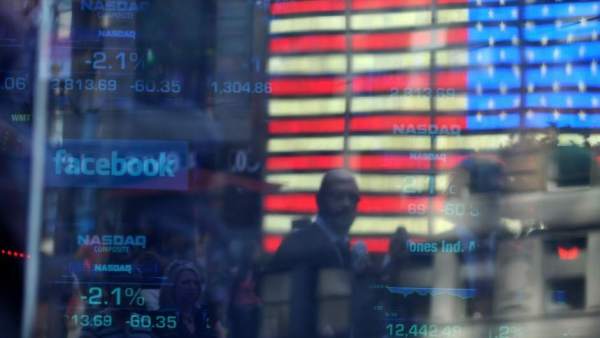The social network is facing the worst crisis of its history.
 File image of the logo of Facebook when it went public in 2012. EFE
File image of the logo of Facebook when it went public in 2012. EFE
The confession came on Tuesday with the scandal of the seepage mass data are still recent: Facebook also collects information even from people outside the social network, in the words of the director of Product Management, David Baser.
This last revelation, which occurs a week after Mark Zuckerberg to sit in the Senate of the US to give explanations for to data leakage from 87 million users, it adds to the vast mountain of controversy that builds up the company from two years ago, the most troubled of the social network. False news, the interference of Russian, Cambridge Analytica, scanning conversations or call history of Android have pushed Facebook into a real international crisis that results in a climate of total concern on the part of users –many have deleted their account– and of absolute uncertainty on the part of the company.
Non-users also at risk
If people who don't use Facebook is they think they are outside the radar of Zuckerberg, you are wrong. David Baser acknowledged yesterday that the social network uses different marketing tools to collect data even from non-users, and the biggest surprise of all came to admit that it is a common practice in the sector, as it happens with Twitter or Linkedin.
"When you visit a web page or an application that uses our services, we receive information, even when you're offline or do not have an account of Facebook," explains the manager on the company's website. The data collection process is carried out, in accordance with their clarification, when a user press the button I like or share or use the social network to register on a portal or an application, which improves your "content and advertising" and includes information about the user's IP address, the browser or the operating system.
Massive filter
Suit and tie sat down Zuckerberg in the u.s. Senate makes exactly a week to give explanations about the scandal that jumped on the 17th of march and that destapaba the leak of data of 50 million users –it later emerged that affected to 87– and that was supposedly exploited by the consulting firm Cambridge Analytica to refine the recruitment strategies of vote during the campaign of Donald Trump in 2016. "We didn't do enough, it was my mistake and I'm sorry," said Zuckerberg to the senators.
'Fake news'
Precisely during those elections, americans, an endless means of false disseminated information that was not real with the purpose of influencing the decision of the voters. According to the FBI and the Senate of the United STATES, Russia is behind this campaign of misinformation, and although the research is in the initial phase, Facebook has acknowledged that the trolls russians invested $ 100,000 in publicity and advertising in those elections. "There are people in Russia whose job it is to try to exploit our systems. This is an arms race," said the founder of Facebook in the Senate when he was asked about it.
The bombardment of false news, however, did not affect only to the elections of USA in 2016. Also there have been campaigns probrexit and there are those who speak of the same thing happened with Catalonia.
Android
The scandal of Cambridge Analytica result of which came to light other controversies, for example, that Facebook has collected SMS as well as the call history of Android to its users for several years, as revealed by several users via Twitter that they had managed to download that history.
Messenger
At the beginning of April, it was revealed that Facebook scans chats and images of the private conversations of Messenger, its chat application, since the tools that the scan had been designed to "detect abusive behavior in the platform." It is unknown if it occurs with the conversations of Instagram and WhatsApp.
SOURCE > Facebook afronta su peor crisis con múltiples frentes abiertos

No comments:
Post a Comment